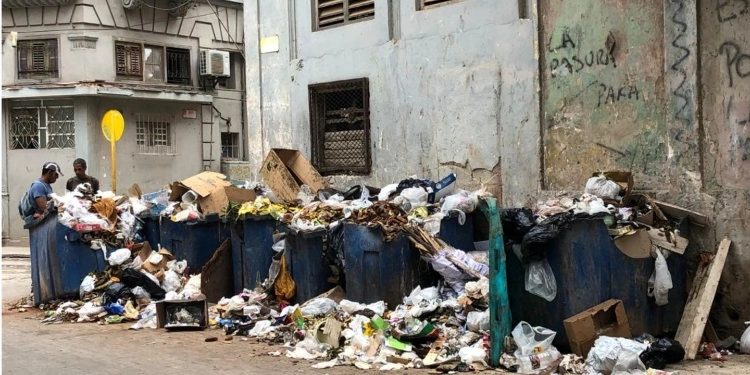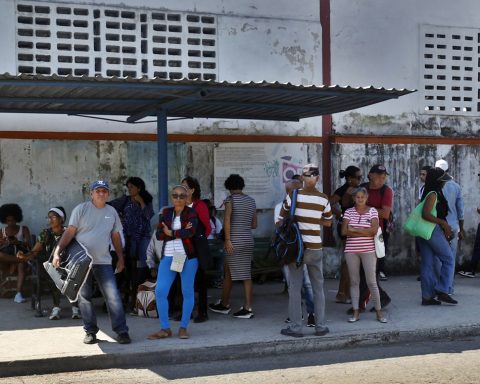HAVANA, Cuba.- “We are breathing shit all the time. “We are almost on par with India,” a middle-aged woman complains from the balcony. To her comment, a man replies that it is no longer possible to stand anywhere on the street without feeling the stench. “Wherever you move, there it is. The whole of Havana is a garbage collector“He said with evident displeasure, but also with the inevitable conformism that accompanies the certainty that the solution to the problem is not in his hands.
It must be said, with justice, that the subject of Garbage in Havana This is nothing new. It has been denounced for years in non-state media and on social networks. The government has responded with the usual justifications: the “blockade”, the lack of fuel and the advanced deterioration of the vehicle fleet; but it has also repeatedly blamed the citizens and the new economic actors.

The above mentioned conditions have only worsened due to the fact that the Cuban crisis does not remit. What began at the end of 2019 as a “conjuncture” is now a quagmire where the structure on which a country is built is slowly but inexorably sinking: economy, political system, public services, culture, moral values and human resources. In the midst of a clearly discouraging panorama, the government clings to the industry tourism and offers what it has: sun, beach and very dirty cities for whoever wants to visit them.
Tourists walking? And the trash…?
It is increasingly It’s rare to see tourists walking around Havanaexcept for groups that are taken and brought back by routes that can leave the best possible impression. Except for the popular council “Catedral” and some other areas of the historic center, the Cuban capital is a huge garbage dump that encourages the proliferation of arboviruses, some well known and others of recent release, such as the fever of Oropouchediscovered in 1955 in Trinidad and Tobago, and whose first known outbreak in Cuba was detected at the end of May.


To date, more than four hundred cases have been confirmed by official sources. Dr. Francisco Durán -national director of Hygiene and Epidemiology- has given an account of the spread of the virus without mentioning the causes that have provoked it, since that would mean pointing the finger directly at the government, the only one authorized to collect the garbage that accumulates on the corners for up to fifteen days or more, under the relentless sun and the downpours.
In the very heart of the capital, monumental mounds of solid waste can be seen invading the streets, hindering vehicular traffic. garbage dumps The animals shown in the images remain in these same conditions for days, within a radius of less than a kilometer and in a densely populated municipality such as Centro Habana, which goes against the socio-environmental practices that must be carried out to prevent the proliferation of vectors that transmit Oropouche fever and other tropical diseases.


The Cuban population, which has lived in a progressive stench for decades, has created defenses in its body to become more resistant to arboviruses, but not the tourists who, for the most part, come from cities with acceptable public hygiene standards.


Havana…
The Cuban state, unable to manage garbage collection, recently turned to private companies Delis Workshops to try to keep landfills at bay in important sections of the Cerro municipality, a solution that will be maintained on an experimental basis for a month, backed by the application of Resolution 87, which penalizes those who deposit waste outside of established hours.
But the nuisance, which is not limited to Cerro, also goes beyond schedules and citizen indiscipline. The government, which in 2018 was already trying to attract foreign investment to improve solid waste collection and produce renewable energy, among other fantasies that did not materialize, approved at the end of 2021 the creation of thousands of micro, small and medium-sized companies without having a minimally adequate infrastructure to manage the enormous amount of garbage they would generate.


The consequences of this decision, inspired by material urgency and the fear of losing political power, are now visible, despite the fact that the flow of foreign visitors that existed before the pandemic has not recovered.
If in 2018 Havana only had fifty trucks for garbage collection – half of those required – six years later the collection vehicles that remain from the batch donated by Japan in 2019 are the ones that pass by, once every four or five days – in the best of cases – to collect the mountains of waste that have turned urban life into a pestilential agony, aggravated by the risk of getting sick in a country where it is impossible to eat properly, have essential medicines and have drinking water with the necessary regularity.
















